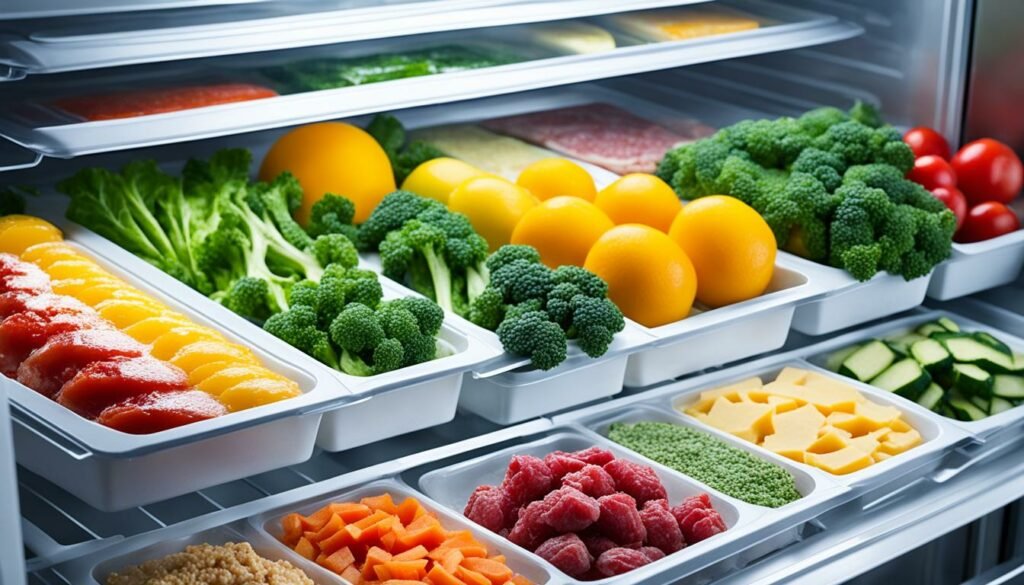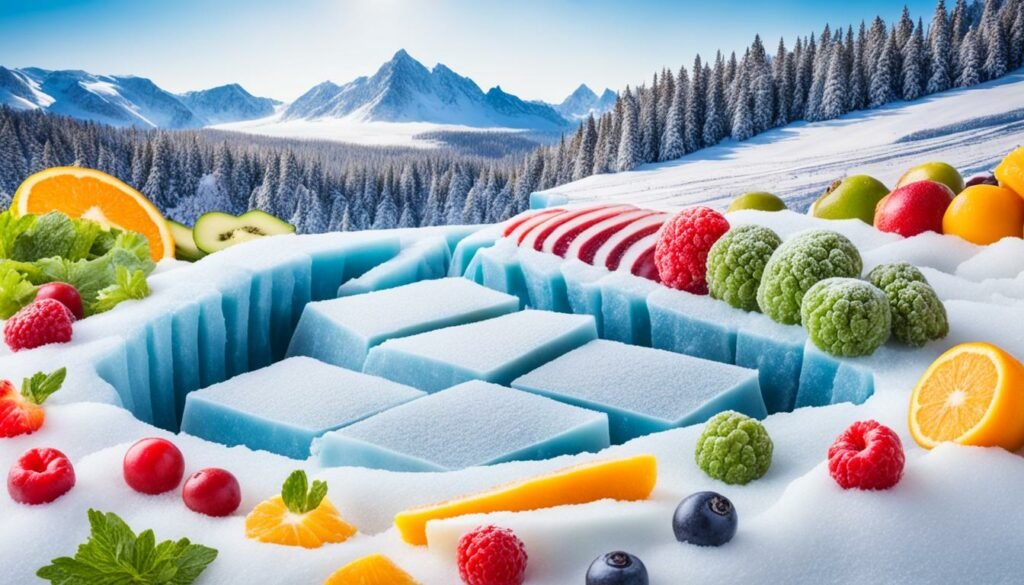Have you ever thought about a smarter way to keep your food fresh? I compared freezing and vacuum sealing. I found out that freezing has some surprising perks.

Freezing is fast and easy, especially for fruits and vegetables. It locks in nutrients better than many methods. This means your food stays healthy even after freezing.
Many like freezing because it’s simple. You don’t need fancy tools like for vacuum sealing. Plus, you can use whatever you have to pack your frozen food. This makes freezing great for anyone wanting to store food at home. Choosing to freeze also gives you in how you package your food.
My tests show that properly frozen food stays good for 8 to 12 months. That’s as good as vacuum sealing! Keep your freezer at 0°F or lower for best results.
While vacuum sealing is useful, freezing has many strong points. It saves money, is simple, and keeps food quality high. When we further look into freezing, you may find it’s the best way to keep your food fresh.
Understanding the Freezing Process for Food Preservation
Freezing is widely used to keep food fresh at home. It’s important to know why this works well. By understanding how freezing works, we can choose the best way to save our food. This includes looking at freezing and vacuum sealing.
Chemical Changes During Freezing
When food freezes, the water in it becomes ice. This ice can form big or small crystals. Big crystals may harm the food, changing its texture when it thaws. This is unlike vacuum sealing, where there’s less chance of ice crystal damage.
Importance of Quick Freezing
Speed is key in freezing food to keep its goodness. Quick freezing makes tiny ice crystals that do less harm to your food. It’s best to freeze food items separately. Don’t put too much in your freezer at once, or it’ll slow down the freezing process.
Role of Enzymes in Food Preservation
Fresh foods have enzymes that can affect their look and taste over time. To prevent this, blanch vegetables or add ascorbic acid to fruits before you freeze them. These steps stop the enzymes from causing damage, keeping your food fresher longer.
| Aspect | Freezing | Vacuum Sealing |
|---|---|---|
| Ice Crystal Formation | Yes | No |
| Enzyme Activity Control | Through blanching/additives | Limited |
| Texture Preservation | Depends on freezing speed | Better for some foods |
Knowing about these steps helps pick the right method for keeping food fresh. Both freezing and vacuum sealing have their pros and cons. Vacuum sealing might work better for some foods, even though freezing is very popular.
Advantages of Freezing Over Vacuum Sealing
When it comes to keeping food fresh, freezing is often better than vacuum sealing. Learning the right way to freeze food can really help at home. Let’s see why freezing might be perfect for your kitchen.
Cost-Effectiveness and Accessibility
Freezing is easy on the wallet. You only need a regular freezer and some containers. While vacuum sealing lets you store food longer, buying a sealer and bags can be expensive. For many, freezing is the simpler and cheaper choice.
Versatility in Packaging Options
I enjoy the variety that freezing provides. You can freeze food in zip-lock bags, plastic containers, or glass jars. This makes it simple to store a wide range of foods. Vacuum sealing, although effective, limits what kind of containers you can use.
Ease of Use for Home Food Preservation
Freezing food is easy. Prep your meals, put them in a container, and freeze. It’s fast and anyone can do it. Vacuum sealing takes a bit more time and effort, especially for a lot of food at once.
| Aspect | Freezing | Vacuum Sealing |
|---|---|---|
| Equipment Needed | Freezer, Containers | Vacuum Sealer, Special Bags |
| Cost | Low | Higher |
| Ease of Use | Very Easy | Moderate |
| Versatility | High | Limited |
While vacuum sealing is great for long-term storage, freezing is more practical for daily needs. By getting good at freezing, you can get most benefits of vacuum sealing without the high cost or extra work.
Freezing vs Vacuum Sealing: A Comprehensive Comparison
Freezing and vacuum sealing both have unique benefits for storing food. Freezing is simple and a method we all know. Vacuum sealing is liked for saving space and keeping food fresh for a long time.
Vacuum sealing is great because it takes out air, which slows down bacteria. This makes food last longer. For example, some say that fish fillets stay fresh for over a year. It’s best for preserving meats without losing their juices and nutrients.
Freezing at home is easy and low cost. Although home freezers might not freeze food quickly, it works well. Freezing also lets you control portions and thaws food faster than vacuum-sealed items.
| Feature | Freezing | Vacuum Sealing |
|---|---|---|
| Cost | Low (existing freezer) | $30+ for sealer |
| Air Removal | Minimal | 70-80% on average |
| Space Efficiency | Moderate | High |
| Freezer Burn Prevention | Moderate | High |
Looking for a vacuum sealer? Even simple models can help food last a lot longer. By combining vacuum-sealing and freezing, your food can last over a year without needing preservatives. This makes it perfect for storing food or getting a head start on meals.
Maintaining Nutritional Value Through Freezing
Freezing is a top way to keep food’s good stuff. It’s crucial to know how to store food right. This keeps frozen food tasty and healthy. Let’s see why freezing is great for saving food for later.
Nutrient Retention in Frozen Foods
Freezing keeps nutrients better than most other ways. By freezing fruits and veggies fast, I lock in their goodness for 8 to 12 months. Quick freezing helps keep food’s cells from breaking, which holds its nutrients and structure.

Impact of Freezing on Vitamins and Minerals
Some nutrients might go away when foods are blanched before freezing. But, many vitamins and minerals stay put. Foods frozen right keep vitamin C, B vitamins, iron, and calcium. This makes them still good for you.
Long-Term Storage Benefits
Freezing is great for long storage. Food stored at 0°F (-18°C) stays good a long time. I can buy lots of seasonal food and enjoy it later. Proper storage shows how frozen foods can stay tasty, healthy, and fresh.
| Food Type | Optimal Storage Time | Nutrient Retention |
|---|---|---|
| Fruits | 8-12 months | High vitamin C retention |
| Vegetables | 8-12 months | Good mineral preservation |
| Meat | 4-6 months | Excellent protein retention |
Best Practices for Freezing Foods at Home
Learning how to freeze food properly helps keep it fresh and safe. I’m here to give you some expert advice on packaging, temperature, and organizing your freezer. These tips will improve your food preservation experience.
Proper Packaging Techniques
Use airtight containers or heavy-duty bags to avoid freezer burn. Try to get rid of as much air as you can before sealing. If it’s something like soup, leave a little room for the liquid to expand. Always write down the contents and date on the package. This makes it easy to know what’s inside.
Optimal Freezer Temperature Settings
It’s best to have your freezer at 0°F (-18°C) or colder. This temp helps stop bacteria and slows down food spoilage. If you’re freezing a lot at once, lower the temp to -10°F (-23°C) the day before. Proper storage is critical for keeping food fresh.
Organizing Your Freezer for Efficiency
Keep your freezer organized to find things easily and avoid wasting food. Put newer foods at the back and older ones up front. Group similar items together. Use clear containers so you can see what’s inside. Don’t crowd the freezer; freeze only 2-3 pounds of food per cubic foot within 24 hours.
Follow these tips to make your food last up to a year longer. This will help you waste less and save money. Good freezing practices work just as well as vacuum sealing to keep your food safe and high quality.
Conclusion
I’ve looked at the benefits of freezing and vacuum sealing. Both are great for keeping food fresh. Freezing is cheap and easy for everyone to use at home. You can put food in different containers or bags and then freeze it.
But, vacuum sealing can keep food fresh even longer. It stops freezer burn very well. The choice depends on what you want and need. For example, meat can stay good for 3-4 years if you vacuum seal it. But if you only wrap it in paper, it might only last a few months.
Some people say just using plastic wrap or freezer paper works fine for them. They’ve kept their meat fresh for years. Remember, it’s important to use the right methods and keep the temperature low.
Vacuum sealing can save a lot of freezer space, up to 50%. Freezing keeps more nutrition in food. So, both freezing and vacuum sealing have good points.
Knowing how to use each method helps. This way, you can keep food fresh for a long time. You’ll also save money and avoid food waste.
FAQ
What are the advantages of freezing over vacuum sealing?
Freezing is better for saving money, time, and it’s practical for families. You can use different packages like zip-lock bags. It retains more nutrients and makes it easy to save smaller meal portions. Plus, it thaws food faster.
How does freezing affect the nutritional value of foods?
Freezing foods rightly keeps more nutrients safe than other ways. Most fruits and veggies keep their nutrition for 8 to 12 months. Quick freezing protects nutrients by causing less cell harm. Still, you might lose some vitamins in the blanching process.
What are the best practices for freezing foods at home?
To freeze foods well, keep air away with tight containers or wraps. Before freezing a lot, lower the freezer to -10°F the day before, then keep it below 0°F. Also, freeze only a few pounds for each cubic foot of space every day. Always keep your freezer tidy, and remember to label everything.
How does freezing compare to vacuum sealing in terms of food preservation?
Freezing and vacuum sealing both keep foods fresh but in different ways. Vacuum sealing cuts off air, which slows down bacteria. However, it may not kill some dangerous bacteria. Freezing preserves more nutrients and is simple to do at home. Vacuum-sealed food still needs to be kept cold or frozen.
What chemical changes occur during the freezing process?
Fast freezing makes tiny ice crystals, which protect the food’s cells. This means the food keeps looking and tasting better. Without quick freezing, enzymes in food can make it lose its color and nutrients. Using blanching for veggies or ascorbic acid for fruits stops these enzymes.
Why is quick freezing important for food preservation?
Freezing food quickly is key to keeping its quality. Trying to freeze too much at once can slow this process down. This can lead to poorer food quality.
